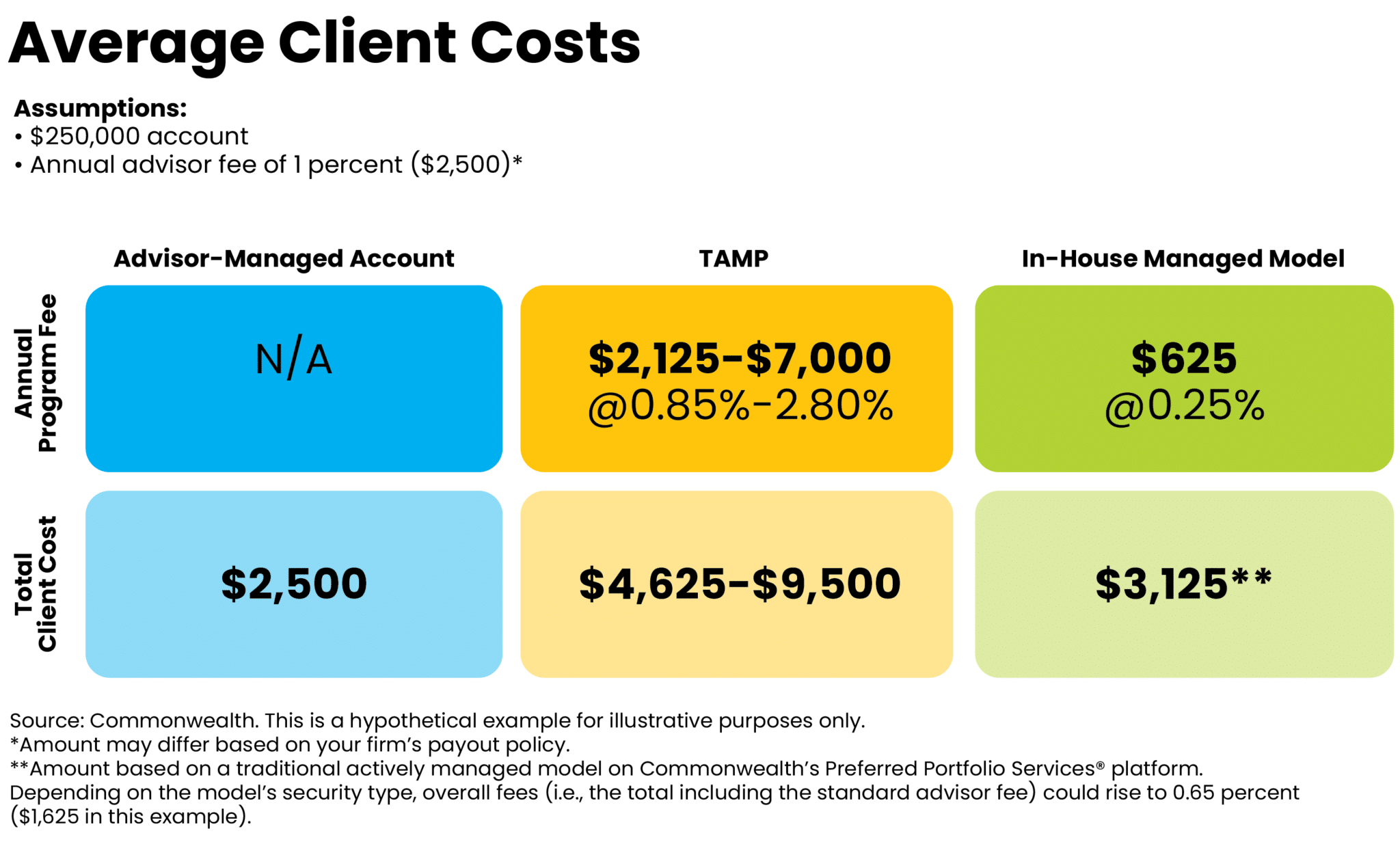For many advisors, a desire to elevate their firm leads to outsourcing investment management. In particular, fee-based and fee-only advisors seeking more value-added services for clients but already working at full capacity may look to outsourcing solutions.
Outsourcing carries the promise of freeing up time otherwise spent on portfolio management — and, potentially, showing clients less common and potentially better investment solutions. Advisors may be hesitant to outsource because they are worried about:
• Losing control over the investment process.
• Tax ramifications of moving accounts.
• Potentially higher costs.
These days, such obstacles are more memory than reality. Let’s dive deeper to discover the many benefits of outsourcing investment management and explore why it has been a key advantage for many advisors.
You’re Still in Control with Outsourcing
Today’s outsourcing options let you continue to play an integral role in the management process.
You can still decide which managers you want to use for your outsourced accounts. The available options include everything from third-party turnkey asset management programs (TAMPs) to the in-house managed portfolio models some firm partners offer. By overseeing the managers’ progress and performance and picking the right model allocation for clients’ risk tolerance and investment objectives, you keep meaningful control over monies held in these accounts.
Outsourcing can be very flexible; it doesn’t have to be an all-or-nothing model. You might choose to take a hybrid approach, for example, continuing to self-manage nonqualified accounts but outsourcing retirement accounts that qualify for tax advantages. The rationale for this approach is to avoid the potential for tax ramifications when moving nonqualified assets that have appreciated.
Outsourcing Can Help Increase a Firm’s Value
Outsourcing investment management involves an additional cost — usually a program fee you charge to a client. The chart below compares average client costs for a hypothetical advisor-managed portfolio, a TAMP, and a firm partner’s in-house managed model. Actual program fees for TAMPs can vary widely, with some reports estimating the cost at 0.85 percent to 2.8 percent, depending on the program’s complexity and the investments.
 Depending on the program, the extra fees could be considerable. It may not be in a client’s best interest, for example, to outsource a $250,000 account to a TAMP charging a program fee of more than 2 percent. For an extra 25 bps to 100 bps, however, many clients might consider the additional cost acceptable given the potential benefits.
Depending on the program, the extra fees could be considerable. It may not be in a client’s best interest, for example, to outsource a $250,000 account to a TAMP charging a program fee of more than 2 percent. For an extra 25 bps to 100 bps, however, many clients might consider the additional cost acceptable given the potential benefits.
Here are a few reasons outsourced investing solutions can help raise your firm’s value — a benefit that also serves clients:
• Given the diversity of managed solutions available, you’ll be able to select the appropriate model portfolios and managers for each client, enabling you to meet their needs more effectively.
• Many managed products show a solid track record across model types.
• Managed accounts can handle the diversification of clients’ product choices by offering solutions that may fall outside your areas of expertise.
• Clients can review a portfolio’s historical performance (subject to your firm’s compliance approval).
• Having someone else manage the assets frees you to spend more time with your clients, strengthening relationships.
The value of these factors cannot be quantified, of course. But once you discuss the benefits of outsourcing with your clients, you may find that the program fee ceases to be an impediment for them—or a reason to reduce your fees.
Outsourcing Increases Efficiency
Advisors who build and manage client portfolios spend a lot of time (or staff resources) on asset research, due diligence, investment reporting, trading and rebalancing, and other managerial tasks.
Outsourcing major time-consuming tasks saves valuable time, freeing you to spend those minutes and hours on client-facing planning work and other revenue-generating activities. A 2020–2021 study Commonwealth conducted in partnership with Cerulli Associates showed that Commonwealth advisors spend 29 percent less time on trading and rebalancing—and 22 percent less time on research, due diligence, and portfolio monitoring—than advisors at wirehouses. This speaks to the strong adoption rate of Commonwealth’s outsourcing solutions, as well as to the technology tools and research guidance available to its affiliated advisors.
Outsourcing can also diminish the business risks of investment staff leaving your firm. If you manage your own portfolios and a key staff member leaves, the disruption has a much greater impact.
In summary, outsourcing could immensely improve your firm’s efficiency and scale.
Choosing the Best Path for You
Managed portfolio solutions are not for every advisor or client. To help make your decision, ask yourself the following questions:
• Is your passion talking to clients or choosing investments?
• Where do your talents lie? For example, can you build solid portfolios, or are you better at financial planning?
• Are you looking to grow the firm or achieve a better work-life balance?
• What choice is in your clients’ best interest?
If you decide to take the outsourcing path for your investment management, it’s important to conduct due diligence, so you fully understand the philosophy, historical performance, and costs of a platform’s options. The firm partner you choose needs to offer resources to help you find potential solutions and increase your reach to include more holistic wealth management.
Brian Glazer is a senior investment advisory consultant with the Investment Advisory Consulting team. With the firm since 2012, Brian provides affiliated advisors with comprehensive solutions to their investment-related questions, assisting them with mutual funds, exchange-traded funds, asset allocation, approved advisory platforms (including our fee-based Preferred Portfolio Services® platform), and overall case design. He holds a BS from the University of Vermont and an MBA from Suffolk University. Brian holds the FINRA Series 7, 24, and 66 securities registrations, as well as the ChFC® designation.
This post originally appeared on Insights, a blog authored by subject matter experts at Commonwealth Financial Network®, Member FINRA/SIPC, a Registered Investment Adviser.







